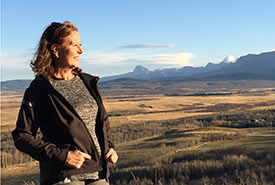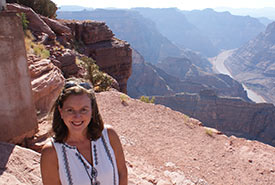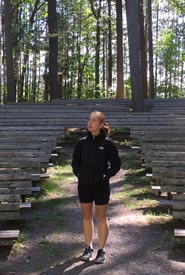Women in conservation: Marcella Zanella

Marcella at Waterton Park Front, AB (Photo by NCC)
In honour of International Women’s Day (March 8), we’re celebrating six female staff members at the Nature Conservancy of Canada (NCC) who are working to create a stronger future for Canada’s landscapes.
Growing up in the Dolomites in the Southern Limestone Alps in northeastern Italy, Marcella Zanella was immersed in beautiful mountain landscapes rivalling that of the Canadian Rocky Mountains. The small, mountain-side village she was raised in had a very tight-knit community, where everyone knew and supported each other.
This inclusivity she experienced as a child helped form her interest in human rights and social justice, which led her to study law at the University of Padua.
As the director, planned giving at NCC, Marcella uses her 12 years of experience as a lawyer to facilitate gifts in a will and other types of estate giving, such as legacy gifts.
Read my interview with Marcella below:
Raechel Bonomo (RB): How has nature impacted your life?
Marcella Zanella (MZ): Nature was my playground growing up. I learned early on from my father how to enjoy and respect the forests, rivers and lakes that enriched our lives. When I turned 18, his gift to me was not a car, which I was hoping for, but a parcel of a forested area. Together, we planted firs and larches and now, decades later when I visit, I take time to hike through the forest that I’m proud to keep protected in his memory.
RB: What work/volunteer experience do you bring to NCC?

Marcella at Grand Canyon, U.S. (Photo courtesy of Marcella Zanella/NCC staff)
MZ: The core of my work is to support donors in choosing the charitable giving option that best fits their personal, financial and tax situation. I think my experience as a lawyer gives me an understanding of the needs, issues, concerns and also values and beliefs of people from all walks of life. In addition, my legal background allows me to understand the technical, legal and tax-related language and concepts related to charitable giving and estate planning.
I’ve been a member of the Canadian Association of Gift Planners since I started my career in fundraising in 2006. I chaired the Greater Toronto Area Chapter for four years. Thanks to my volunteer role, I’ve built a network of advisors in the fields of law, investment, tax and financial planning across Canada.
RB: How do contributions from Canadians to NCC through legacy gifts impact land conservation in our country?
MZ: Legacy gifts left to NCC are powerful agents of change, especially when they’re unrestricted gifts, meaning the money is not designated to a specific project or region. This allows NCC the flexibility to address the top conservation priorities at the time the gift is received.
They provide funds for urgent purchases of land and funding for the growth of NCC’s Stewardship Endowment Fund. These planned gifts also fund conservation planning work that guides us in determining the best places to focus our conservation efforts today and in the future.
In the past 50 years, NCC has been fortunate to receive hundreds of estate gifts from individuals from all walks of life who shared the vision of Canadians conserving nature in all its diversity, by caring for the lands and waters that sustain life.
The footprints of these lives lived are imprinted within the awe-inspiring landscapes and diversity of wildlife across Canada that we all can enjoy now and for years to come.


